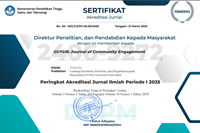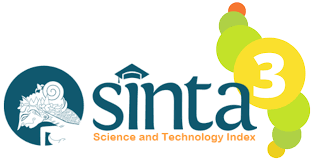Afiyanti, Yati. 2008. “Focus group discussion (diskusi kelompok terfokus) sebagai metode pengumpulan data penelitian kualitatif.” Jurnal Keperawatan Indonesia 12(1):58–62. https://doi.org/10.7454/jki.v12i1.201
Akayoglu, Sedat, H. Müge Satar, Kenan Dikilitas, Nazlı Ceren Cirit, dan Sibel Korkmazgil. 2020. “Digital Literacy Practices of Turkish Pre-Service EFL Teachers.” Australasian Journal of Educational Technology 36(1):85–97. doi: 10.14742/ajet.4711.
Alexandro, Rinto, dan Basrowi. 2024. “Measuring the effectiveness of smart digital organizations on digital technology adoption: An empirical study of educational organizations in Indonesia.” International Journal of Data and Network Science 8(1):139–50. doi: 10.5267/j.ijdns.2023.10.009.
Alim, Muhammad Nurul, Ruslan Husein Marasabessy, Irwan Maulana, Evan Hamzah Muchtar, Edy Junaedi, dan Wahyu Hidayat. 2023. “Improving Literacy of Forbidden Selling and Buying in Contemporary Transactions Through Service-Learning Method.” Al-Arkhabiil: Jurnal Pengabdian Masyarakat 3(3):1–11. doi: 10.51590/jpm_assunnah.v3i3.567.
Arquero, José L., dan Esteban Romero-Frías. 2013. “Using social network sites in Higher Education: an experience in business studies.” Innovations in Education and Teaching International 50(3):238–49. doi: 10.1080/14703297.2012.760772.
Audrin, Catherine, dan Bertrand Audrin. 2022. “Key factors in digital literacy in learning and education: a systematic literature review using text mining.” Education and Information Technologies 27(6):7395–7419. doi: 10.1007/s10639-021-10832-5.
Basrowi. 2024. “Uniba dan PP Al-Mubarok Melakukan Pelatihan Technopreneur dengan Metode CIBEST Menuju Deradikalisasi.” kompasiana. Diambil (https://www.kompasiana.com/basrowi/64f6ef744addee73b1211682/uniba-dan-pp-al-mubarok- melakukan-pelatihan-technopreneur-dengan-metode-cibest-menuju-deradikalisasi%0AKompasiana).
Basrowi, dan Pertiwi Utami. 2020. “Building Strategic Planning Models Based on Digital Technology in the Sharia Capital Market ?” Journal of Advanced Research in Law and Economics 11(3):747–54. doi: https://doi.org/10.14505/jarle.v11.3(49).06.
Bell, Robin, dan Heather Bell. 2020. “Applying educational theory to develop a framework to support the delivery of experiential entrepreneurship education.” Journal of Small Business and Enterprise Development 27(6):987–1004. doi: 10.1108/JSBED-01-2020-0012. https://doi.org/10.1108/JSBED-01-2020-0012
Carugati, Andrea, Lapo Mola, Loïc Plé, Marion Lauwers, dan Antonio Giangreco. 2020. “Exploitation and exploration of IT in times of pandemic: from dealing with emergency to institutionalising crisis practices.” European Journal of Information Systems 29(6):762–77. doi: 10.1080/0960085X.2020.1832868.
Cuéllar, Dr C., Dr M. A. Guzmán, C. Lizama, dan M. P. Faúndez. 2021. “Educational continuity during the pandemic: Challenges to pedagogical management in segregated chilean schools.” Perspectives in Education 39(1):44–60. doi: 10.18820/2519593X/pie.v39.i1.4.
Fauziyah, Tias Rahmi, Iwan Triyuwono, dan Lilik Purwanti. 2023. “Sustainable Islamic Selling Price with Reference to Ibn Taimiyah’s Thoughts.” Journal of Economics, Finance and Management Studies 06(08):3672–78. doi: 10.47191/jefms/v6-i8-14.
Izhar, Nurul Ashikin, Yahya M. Al-Dheleai, dan Nor Asniza Ishak. 2021. “Education Continuation Strategies during COVID-19 in Malaysia.” International Journal of Academic Research in Business and Social Sciences 11(4). doi: 10.6007/ijarbss/v11-i4/9840.
Khan, Waqas, Saira Sohail, Muhammad Azam Roomi, Qasim Ali Nisar, dan Muhammad Rafiq. 2024. “Opening a new horizon in digitalization for e-learning in Malaysia: Empirical evidence of Covid-19.” Education and Information Technologies 29(8):9387–9416. doi: 10.1007/s10639-023-12176-8.
Lassoued, Zohra, Mohammed Alhendawi, dan Raed Bashitialshaaer. 2020. “An exploratory study of the obstacles for achieving quality in distance learning during the covid-19 pandemic.” Education Sciences 10(9):1–13. doi: 10.3390/educsci10090232.
Lorange, Peter, dan Howard Thomas. 2016. “Pedagogical advances in business models at business schools – in the age of networks.” Journal of Management Development 35(7):889–900. doi: 10.1108/JMD-11-2014-0150.
Maqsood, Aneela, Jaffar Abbas, Ghazala Rehman, dan Riaqa Mubeen. 2021. “The paradigm shift for educational system continuance in the advent of COVID-19 pandemic: Mental health challenges and reflections.” Current Research in Behavioral Sciences 2(December 2020):100011. doi: 10.1016/j.crbeha.2020.100011.
Phelan, Anne M., Cristina D. Vintimilla, dan Veronica Pacini-Ketchabaw. 2024. “Schooling the pandemic: Education after the event.” Journal of Curriculum and Pedagogy. doi: 10.1080/15505170.2024.2338547.
Qazi, Muhammad Arsam, Muhammad Aiyaz Sharif, dan Ather Akhlaq. 2024. “Barriers and facilitators to adoption of e-learning in higher education institutions of Pakistan during COVID-19: Perspectives from an emerging economy.” Journal of Science and Technology Policy Management 15(1):31–52. https://doi.org/10.1108/JSTPM-01-2022-0002
Quaicoe, James Sunney, dan Kai Pata. 2020. “Teachers’ digital literacy and digital activity as digital divide components among basic schools in Ghana.” Education and Information Technologies 25(5):4077–95. doi: 10.1007/s10639-020-10158-8.
Rusydiyah, Evi Fatimatur, Eni Purwati, dan Ardhi Prabowo. 2020. “How to use digital literacy as a learning resource for teacher candidates in Indonesia.” Cakrawala Pendidikan 39(2):305–18. doi: 10.21831/cp.v39i2.30551.
Sánchez-Cruzado, Cristina, Raúl Santiago Campión, dan Ma Teresa Sánchez-Compaña. 2021. “Teacher digital literacy: The indisputable challenge after covid-19.” Sustainability (Switzerland) 13(4):1–29. doi: 10.3390/su13041858.
Udeogalanya, Veronica. 2022. “Aligning digital literacy and student academic success: Lessons learned from COVID-19 pandemic.” International Journal of Higher Education Management 08(02):54–65. doi: 10.24052/ijhem/v08n02/art-4.
Uyuni, Badrah. 2021. “The Rasulullah’s Way of Business: as the Best Example for Student.” Jurnal Bina Ummat: Membina dan Membentengi Ummat 4(1):121–37. doi: 10.38214/jurnalbinaummatstidnatsir.v4i1.102.
 (Sekolah Tinggi Ekonomi dan Bisnis Islam Lampung)
(Sekolah Tinggi Ekonomi dan Bisnis Islam Lampung) 









.png)
